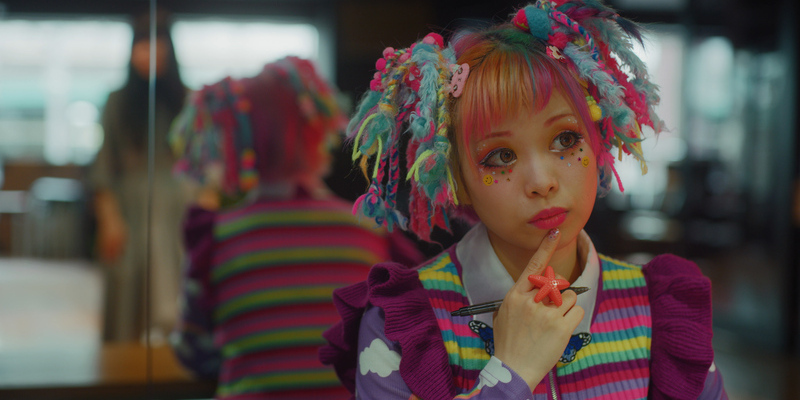
Review by
Eric Hillis
Directed by: Philippe McKie
Starring: Bambi Naka, Masahiro Takashima, Akaji Maro, Ikuyo Kuroda

Japan based Canadian writer/director Philippe McKie's feature
debut Dreams on Fire is a musical that follows a template
as old as the genre itself, that of a young woman battling adversity as
she tries to make her way in the cutthroat world of dance. While its
plot could have been borrowed from any number of 1930s musicals,
Dreams on Fire plays out in a very modern setting, the
neon soaked streets, bars and clubs of Tokyo, and updates an old story
with contemporary concerns.
Making her acting debut as our protagonist Yume is Bambi Naka,
herself a dancer who has toured with Madonna. We first see Yume as a
young girl, enraptured by a dance troupe. "I want to be a dancer," she
exclaims in delight. Smash cut to a decade later and Yume, now in her
late teens, is arguing with her grandfather (Akaji Maro), who
thoroughly disapproves of Yume's ambitions, cruelly blaming her for her
mother's (Ikuyo Koroda) sickness.

Yume storms out and heads for the bright lights of Tokyo, where she
ends up living in a bedsit smaller than the average 1950s American
family fridge. Desperate to become a professional dancer, Yume takes
part in various tournaments while taking classes to hone her skills. To
fund her ambitions she accepts a job as a hostess at a club, where she
is required to entertain drunken men while dressed as a
schoolgirl.
If you've seen any musicals of this sort, from
42nd Street to Flashdance, you'll be familiar with the various boxes ticked by
Dreams on Fire's generic plotting. Yume faces exactly the sort of ups and downs you
would expect, the only real difference being now she has to contend with
social media as casting directors care more about how many Instagram
followers she has accumulated than her dance skills.

While the plot is as straightforward as you might expect from a
musical, it feels unfocussed. We're never quite aware of just what
Yume's ultimate goal is, and the film often feels as though it's making
up its story as it goes. With most movies of a similar nature, we know
our protagonist is aiming to win some ultimate competition, something
that isn't established here until the movie is almost over.
If anything, there's an imbalance between the ups and downs of Yuke's
journey. Things seem to go a little too easy for her, and any setbacks
she suffers seem relatively minor. Practically everyone she meets who
isn't a predatory man goes out of their way to help her, sometimes in
inexplicable fashion like the fellow hostess who donates her a week's
wages out of pity. Yuke's troubled home life appears to have been
forgotten about, save for a late dream sequence.

As a musical, Dreams on Fire suffers from a lack of
understanding from McKie of how to shoot the genre. Naka and the various
other dancers we meet are all clearly very talented, so it's incredibly
frustrating that McKie films his dance sequences in heavily edited
close-ups, rarely allowing us to soak up their skills in a wide
shot.
Dreams on Fire will likely hold niche appeal for dance
enthusiasts, but if it's worth seeking out for anyone else it's down to
the performance of Naka. Aside from her moves, she delivers a striking
debut performance. Watching Dreams on Fire, you realise you're watching a star in the making, both on and off
screen.

Dreams on Fire plays online at
the Glasgow Film Festival from March 6th to 9th.

